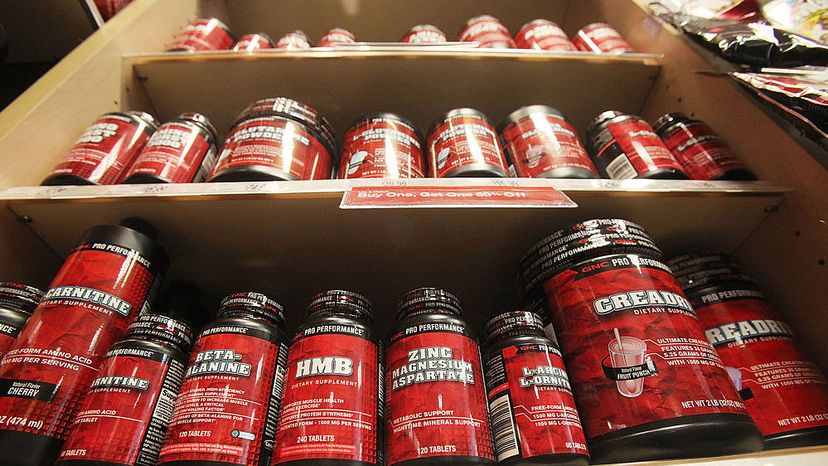Likelihood is good there are some dietary dietary supplements proper now in your cabinet. Analysis reveals almost 70 p.c of Individuals are downing them, serving to drive a $19 billion market in 2015. Much more eyebrow-raising, by 2024, the worldwide dietary complement market measurement is predicted to hit a whopping $278 billion, fueled by the growing use of dietary supplements to deal with malnutrition and cardiovascular issues [sources: Council for Responsible Nutrition, Globe Newswire].
Dietary dietary supplements are tablets, capsules, powders or liquids that include nutritional vitamins, minerals, herbs, amino acids and/or enzymes. Folks use them not solely to remain wholesome, but additionally to keep away from prescribed drugs, shed weight, and even to boost sports activities or sexual efficiency. And that is nothing novel.
People have been utilizing some type of dietary dietary supplements because the daybreak of civilization. 5-thousand-year-old Sumerian clay tablets are inscribed with data of the herbs they used — the earliest identified written data. As well as, Asian cultures have a wealthy historical past of natural utilization stretching again greater than 3,000 years. The guide in English on herbs was revealed in 1526 [source: Herbal Academy].
Right now’s complement business is powerful and rising, fueled by suggestions from physicians, pals who swear by one pure treatment or the opposite, and aggressive advertising and marketing by complement firms themselves. Within the U.S., most complement customers take nutritional vitamins and minerals, with the common-or-garden multivitamin the most well-liked merchandise, adopted by vitamin D, vitamin C and calcium. Within the specialty complement class, Omega 3/fatty acids, fiber and probiotics are the most well-liked, whereas amongst herbals and botanicals, Individuals favor inexperienced tea, cranberry, garlic and ginseng. Usually, women and men are equally enamored of the merchandise [source: Council for Responsible Nutrition].
However simply as with different health-related merchandise or practices, steerage on dietary supplements is consistently altering as science evolves. In 2013, girls had been flummoxed when the U.S. Preventive Companies Job Power mentioned postmenopausal females shouldn’t be taking calcium and vitamin D, as neither helped forestall bone fractures. Even worse, some research linked calcium supplementation with coronary heart illness, kidney stones and gastrointestinal issues.
Nonetheless, one other examine by the Girls’s Well being Initiative discovered long-term use of calcium and vitamin D did seem to considerably decrease the danger of hip fractures in postmenopausal girls, with little danger for kidney stones. So, who’s appropriate? Right now, many docs inform sufferers of each sexes to nix the calcium dietary supplements, no matter age, and as a substitute eat three or 4 servings of calcium-rich meals day by day [sources: Cooper, Ray].
Maybe as regarding as continuously altering complement suggestions is the truth that many individuals at the moment are ingesting an astonishing array of dietary supplements that haven’t any scientific proof of being efficient.
Contents
- Federal Regulation of Dietary supplements
- Smart Complement Utilization
- Meals vs. Dietary Dietary supplements
Federal Regulation of Dietary supplements
“
Maybe the most important potential hazard relating to dietary supplements — and crucial factor shoppers want to comprehend — is that the business at the moment is just loosely regulated. It wasn’t at all times this manner. Earlier than 1990, dietary dietary supplements had been tightly managed by the Meals and Drug Administration (FDA). Too tightly managed, some say, almost inflicting the business to break down. A part of the tight management meant "dietary dietary supplements" referred to just a few important vitamins, together with nutritional vitamins, minerals and proteins, and after 1990, additionally herbs. However in 1994, there was an enormous change [source: FindLaw].
That 12 months, Congress handed the Dietary Complement Well being and Schooling Act (DSHEA), which expanded the definition of "dietary complement" to incorporate amino acids (e.g., lysine, tryptophan), and metabolites and extracts (e.g., bilberry extract, chamomile tea), amongst different substances. It additionally outlined dietary dietary supplements as meals, not as medicine or meals components (like spices). These modifications meant dietary supplements immediately had a lot much less federal oversight or regulation, and the business boomed [sources: FindLaw, Scarbrough, Institute of Food Technologists].
In trade for the looser regulation, makers of dietary dietary supplements couldn’t declare their merchandise cured any ailments (as a result of that may make them medicine regulated by the FDA). Additionally they needed to embody all substances on a product’s label, and determine that the product was a "dietary complement." Though a label might make a declare concerning the complement’s optimistic impact on the physique, it additionally needed to say, "This assertion has not been evaluated by the Meals and Drug Administration. This product just isn’t meant to diagnose, deal with, remedy or forestall any illness." It was as much as the producer to make sure that its product was protected, though the secretary of Human and Well being Companies might declare {that a} complement or an ingredient in a complement was hazardous to well being [source: FindLaw].
The FDA has established good manufacturing practices for complement producers to assist make sure you’re getting what’s marketed — that your capsules do not include an excessive amount of or too little of an ingredient, for instance, or a contaminated product. And the FDA often will examine a complement manufacturing facility. However the FDA doesn’t must approve a complement earlier than it may be delivered to market [source: National Institutes of Health].
To assist guarantee dietary supplements are protected, a number of impartial organizations supply high quality testing. If a producer submits a complement to the testing and passes, the product is allowed to hold a seal of approval that ensures it was correctly manufactured, comprises the substances on its label and would not have dangerous ranges of contaminants. Among the extra notable testing organizations are ConsumerLab.com, NSF Worldwide and U.S. Pharmacopeia. A couple of of the a whole lot of dietary supplements that earned high quality seals are dietary supplements produced by Kirkland (Costco), NatureMade and Nutrilite (Amway) [sources: National Institutes of Health, Quality Supplements, NSF].
Nonetheless, even a top quality seal does not imply any given complement will be just right for you, or that it is protected to your physique. And that is among the ongoing debates.
Smart Complement Utilization
Most likely essentially the most frequent questions relating to complement utilization are which dietary supplements to make use of and which to keep away from. The reply to the primary query is determined by your physique and its distinctive wants, so at all times seek the advice of your doctor earlier than utilizing any complement. That being mentioned, Shopper Studies and the Pure Medicines Complete Database, an impartial analysis group, compiled a listing of a number of the high dietary supplements that analysis reveals are probably protected and could also be efficient for sure circumstances. These are:
- Calcium
- Cranberry
- Fish oil
- Glucosamine sulfate
- Lactase
- Lactobacillus
- Psyllium
- Pygeum
- SAMe
- St. John’s wort
- Vitamin D
The 2 teams additionally recognized a dozen complement substances to be averted because of their hyperlinks to severe negative effects:
- Aconite
- Bitter orange
- Chaparral
- Colloidal silver
- Coltsfoot
- Comfrey
- Nation mallow
- Germanium
- Higher celadine
- Kava
- Lobelia
- Yohimbe
For instance, coltsfoot — considered efficient for bronchitis and bronchial asthma — is linked to liver harm and most cancers. Bitter orange, supposedly helpful for weight reduction, nasal congestion and allergic reactions, could trigger fainting, coronary heart assault, stroke and even demise [source: Consumer Reports].
Whereas it is useful to have "good" and "dangerous" lists, do not rush off to the shop and buy all 11 of the "good" dietary supplements listed above. Your physique won’t want them, for one. Additionally, a number of the proof as as to whether these dietary supplements "work" is conflicting. For example, some research say glucosamine sulfate helps relieve ache and improves joint perform for folks with arthritis. Different research say it solely relieves joint ache [source: Arthritis Foundation].
Lastly, not all dietary supplements are of the identical high quality. Grow to be a savvy complement shopper by following these practices [source: U.S. Food & Drug Administration]:
- If you happen to’re trying on-line for complement info, use noncommercial websites such because the Nationwide Institutes of Well being (NIH), U.S. Meals & Drug Administration (FDA) and the U.S. Division of Agriculture (USDA).
- Be cautious of any product that claims "completely protected," "has no negative effects" or "works higher than [prescription drug name]."
- Have in mind no complement ought to declare to have the ability to forestall, deal with or remedy a illness. It is towards the legislation for firms to try this as a result of the complement then could be thought of a drug and topic to these FDA laws.
- Keep in mind that simply because an ingredient is pure does not imply it is protected to devour.
- Dietary supplements, even high quality ones, can negatively work together with prescription remedy you take, so at all times discuss to your doctor about any dietary supplements you wish to take.
- Extra just isn’t essentially higher. In case your physician suggests you add vitamin D to your food regimen and also you find a good model, take solely the dosage advisable.
- Do not take dietary supplements rather than remedy (or along with it) with out checking together with your physician.
- Nutritional vitamins are already added to sure meals (like milk or breakfast cereal). Including a vitamin capsule on high of this could be overkill and in some cases, truly harmful to your well being.
Be particularly cautious of any dietary supplements promising that will help you shed weight quick, construct muscle or improve your sexual prowess. A lot of them include very dangerous substances, steroids or prescribed drugs. In a well-known case, a Chinese language herb known as ephedra was marketed for weight reduction. Though it was a pure product, it contained a chemical known as ephedrine that stimulated the nervous system and constricted blood vessels. It was linked to greater than 15 deaths by 1996. Nonetheless, the FDA didn’t ban it till 2004 after the demise of a serious league baseball participant [sources: Couzin-Frankel].
Meals vs. Dietary Dietary supplements
“
Foodies, rejoice: Specialists say it is best to get your nutritional vitamins and minerals from contemporary, tasty meals somewhat than dietary supplements. The issue is, folks (particularly Individuals) aren’t consuming all that a lot contemporary meals, as a substitute favoring processed meals, refined grains and added sugars, all of which have little dietary worth. If you happen to’re aged, the issue is compounded as a result of aged our bodies cannot soak up vitamins as simply as younger ones can. Plus, seniors typically eat much less meals general because of dampened appetites. Ultimately, many individuals merely are unable to get the vitamins they want from the meals they eat.
Dietary dietary supplements might help fill gaps in your food regimen in case you do not eat numerous nutritious meals. However earlier than you head to the complement aisle, consultants suggest first making an attempt to eat more healthy. That is as a result of, it is not simply the particular complement you are lacking — it is also the way you’re receiving it that issues.
Meals comprises many useful vitamins in addition to phytochemicals. Phytochemicals are plant chemical compounds which have properties that shield you from illness. The phytochemical allicin, for instance, is discovered naturally in garlic and helps struggle micro organism, whereas isoflavones in soy and will reduce menopausal signs in some girls. Phytochemicals can also improve bioavailability, which is the quantity of the vitamin or mineral that your physique is ready to soak up. However phytochemicals will not be included in dietary supplements [sources: Berkeley Wellness, Phytochemicals].
Moreover, meals comprises vitamins that assist one another out. Down a frosty glass of milk and you will be gifted not simply vitamin D and numerous vitamins and phytochemicals, but additionally lactose, which helps your physique soak up calcium and magnesium. If you happen to merely took a complement, all you’d get is the vitamin D. Additionally, in case you take an excessive amount of vitamin D (or every other complement), it’d have an effect on your physique’s means to correctly soak up numerous vitamins.
Lastly, whereas the vitamins in dietary supplements and meals could also be chemically similar, that does not essentially imply they are going to act the identical manner in your physique. A examine by researchers on the College of Pennsylvania Faculty of Drugs confirmed the precious Omega-3s in fatty fish had been higher in a position to preserve correct blood stress in mice than the Omega-3 in fish oil dietary supplements. Within the examine, the scientists noticed how one of many fish fatty acids, docosahexaenoic acid (DHA), lowered blood stress by dilating blood vessels at ion channels. However the DHA ethyl ester, which most fish oil dietary supplements include, didn’t dilate the blood vessels at these websites. Even worse, the DHA ethyl ester appeared to struggle with the pure DHA [source: Science Daily].
So eat extra contemporary meals. Take solely dietary supplements advisable by your physician and move on the remainder. And keep on high of the information for contemporary updates on the subject.







